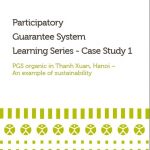
27 downloads
Title of document: Participatory Guarantee System Learning Series - Case Study 1 “PGS organic in Thanh Xuan, Hanoi – An example of sustainability” Authors: VECO Journal’s name if any: Ministry/Government Agency/Organisation: VECO, ALiSEA Year of publication: 2018 Geographic focus: Vietnam Main issues / topics addressed (for example: PGS organic in Thanh Xuan, Hanoi – An example of sustainability; Context; PGS operational model; PGS’ performance in Thanh Xuan…) School of agroecology (if any): Web address to original document (if any): Summary: Participatory Guarantee System (PGS) is a low-cost quality assurance mechanism that guarantees the quality of agricultural products and has the potential to regain consumers’ trust. Implemented in 66 countries worldwide, it has been used in Vietnam for over 10 years. As part of the project “Capitalisation of Participatory Guarantee System experiences in Vietnam for upscaling & institutionalisation”, Vietnam National University of Agriculture and Rikolto investigated all the existing PGS in Vietnam to assess their strengths and weaknesses and come up with recommendations on how to improve PGS in the Vietnamese context. This case study investigates the factors that made PGS Thanh Xuan the most successful PGS model in Vietnam and identifies some of the features that should be replicated by other PGS to improve their sustainability Read More
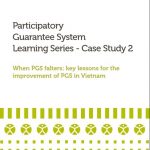
16 downloads
Title of document: Participatory Guarantee System Learning Series - Case Study 2 “When PGS falters: key lessons for the improvement of PGS in Vietnam” Authors: VECO Journal’s name if any: Ministry/Government Agency/Organisation: VECO, ALiSEA Year of publication: 2018 Geographic focus: Vietnam Main issues / topics addressed (for example: When PGS falters: key lessons for the improvement of PGS in Vietnam; Context; Challenges; Recommendations…) School of agroecology (if any): Web address to original document (if any): Summary: Participatory Guarantee System (PGS) is a low-cost quality assurance mechanism that guarantees the quality of agricultural products and has the potential to regain consumers’ trust. Implemented in 66 countries worldwide, it has been used in Vietnam for over 10 years. As part of the project “Capitalisation of Participatory Guarantee System experiences in Vietnam for upscaling & institutionalisation”, Vietnam National University of Agriculture and Rikolto investigated all the existing PGS in Vietnam to assess their strengths and weaknesses and come up with recommendations on how to improve PGS in the Vietnamese context. The case study below looks at one PGS in particular which has struggled with sustainability and operational effectiveness Read More
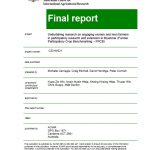
5 downloads
Title of document: Undertaking research on engaging women and men farmers in participatory research and extension in Myanmar (Farmer Participatory Crop Benchmarking – FPCB) Authors: Kyaw Zin Win, Nyein Nyein Htwe, Khaing Khaing Htwe, Thuzar Win, Chris Guppy, Matt Denton Journal’s name if any: Ministry/Government Agency/Organisation: ACIAR Year of publication: Geographic focus: Myanmar Main issues / topics addressed (for example: Background; Objectives; Methodology; Achievements against activities and outputs/milestones; Key results and discussion…) School of agroecology (if any): Web address to original document (if any): Summary: The Farmer Participatory Crop Benchmarking (FPCB) study was implemented as an 18-month pilot study in Magwe township in the Central Dry Zone and is the first of its kind in Myanmar. The farmer-participatory benchmarking provided both a methodology for developing scientific understanding on soil and crop management, and for developing a participatory adult-learning approach to extension. The project involved three key stakeholders, farmers, extension workers and research scientists, working together to identify constraints to crop yield and thereby raise productivity. Read More
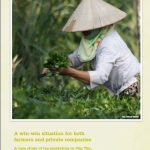
5 downloads
Title of document: A win-win situation for both farmers and private companies “A case study of tea marketing in Phu Tho, Vietnam” Authors: Vredeseilanden/VECO Journal’s name if any: Ministry/Government Agency/Organisation: Vredeseilanden/VECO Year of publication: 2013 Geographic focus: Vietnam Main issues / topics addressed (for example: Tea sector Vietnam; The tea chain in Yen Lap district; Towards a business organization, high quality and good price; Results and future perspectives…) School of agroecology (if any): Web address to original document (if any): Summary: Tea is the second most popular drink in the world, after water. For a number of developing countries, including Vietnam, tea is an important commodity in terms of jobs and export earnings. However, as with many other agricultural commodities, real primary producer prices have fallen dramatically over the last three decades. VECO is active in Yen Lap district, Phu Tho province, where tea is a major crop, often accounting for over 40% of family income. Chain development is seen as an approach which can improve the quality of the tea by developing strong market linkages and collective actions, resulting in a better income for farmers. Read More
7 downloads
Title of document: Income Distribution in Vietnam’s Rice Value Chain Authors: Tran Cong Thang Journal’s name if any: Ministry/Government Agency/Organisation: IPSARD Year of publication: 2017 Geographic focus: Vietnam Main issues / topics addressed (for example: Introduction; Distribution of profits in the domestic rice value chain; Distribution of profits in the value chain of rice export ; Conclusion…) School of agroecology (if any): Web address to original document (if any): Summary: The main actors in the Vietnamese rice value chain are farmers (paddy growers), traders, processors (drying, milling, polishing), and food trading and export enterprises. Of these, many export enterprises have owned milling and polishing systems to meet the conditions of rice export in accordance with Decree 109/2010/ND-CP. In this case, the export enterprises have also played the role of processors as well as exporters in the value chain Read More
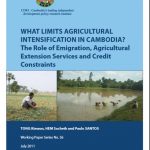
7 downloads
Title of document: What limits agricultural intensification in Cambodia? The Role of Emigration, Agricultural Extension Services and Credit Constraints Authors: TONG Kimsun, HEM Socheth and Paulo SANTOS Journal’s name if any: Ministry/Government Agency/Organisation: CDRI Year of publication: 2011 Geographic focus: Cambodia Main issues / topics addressed (for example: Introduction; Literature review; Data; Empirical approach and estimates; Conclusion …) School of agroecology (if any): Web address to original document (if any): Summary: This paper attempts to define the factors which determine emigration and rice doublecropping, i.e. rice cultivation on the same plot twice per year, by rural households in Cambodia, and investigates whether these decisions influence each other using data from a two-period panel survey of 231 households in three provinces in rural Cambodia. In the analysis, we take into account possible correlation between these decisions (through estimating a seemingly unrelated bivariate probit model) and unobserved heterogeneity among farmers (through estimating a random-effects probit model). It is found that rice double-cropping and emigration decisions are not closely inter-related. We can also conclude that the availability of water and agricultural land are the key determinants of rice double-cropping. Households which rely on animal draught power for agricultural production are unlikely to engage in rice double-cropping. Policies aimed at increasing irrigation and providing socioeconomic land concessions in rural areas may play a critical role in improving agricultural production. Read More
80 downloads
Title of document: Current Use of Pesticides in the Agricultural Products of Cambodia Authors: Visarto Preap and Kang Sareth Journal’s name if any: Ministry/Government Agency/Organisation: MAFF Year of publication: Geographic focus: Cambodia Main issues / topics addressed (for example: Introduction; Pesticide use; Feature actions; Conclusion…) School of agroecology (if any): Web address to original document (if any): Summary: Lack of law enforcement to farmers especially those who greatly depend on using pesticides created a big challenge for pesticide management in Cambodia; banned and restricted pesticides are widely available in the local markets. Counterfeit and illegal pesticide products are often found in unregistered pesticide shops/retailers. To fight against these challenges Cambodia shall take priority actions: improve border inspection on circulation of pesticides, and strengthening pesticide management law. Read More
7 downloads
Title of document: Integrated Nutrient–Weed Management under mechanised Dry Direct Seeding (DDS) is essential for sustained smallholder adoption in rainfed lowland rice (Oryza Sativa L.) Authors: Pheng Sengxua, Tamara Jackson, Phetsamone Simali, Leigh K. Vial, Khamsouk Douangboupha, Elizabeth Clarke, Dome Harnpichitvitaya and LEN J. WADE Journal’s name if any: Ministry/Government Agency/Organisation: Cambridge University Press Year of publication: 2018 Geographic focus: Lao PDR Main issues / topics addressed (for example: Introduction; Materials and Methods; Results and Discussion; Conclusion…) School of agroecology (if any): Web address to original document (if any): https://www.cambridge.org/core/journals/experimental-agriculture/article/integrated-nutrientweed-management-under-mechanised-dry-direct-seeding-dds-is-essential-for-sustained-smallholder-adoption-in-rainfed-lowland-rice-oryza-sativa-l/9BF9B05F08CFE5505AC994E5F1234274 Summary: In rainfed lowland rice-based systems, increasing labour scarcity due to off-farm employment is encouraging farmers to switch from transplanting to dry direct seeding (DDS). To assure stable productivity at a level comparable with or superior to transplanting, DDS management must ensure rice seedlings have access to nutrients in order to be competitive with weeds, which must also be suppressed. This paper examined farmer perceptions of DDS using a farmer survey, and used on-farm experiments to examine responses of rainfed lowland rice to integrated nutrient–weed management, based around mechanized DDS. In the survey, weeds were the biggest problem faced by farmers in using DDS (61%). In 90% of cases, farmers reported that weeds had increased under DDS, with most farmers (78%) controlling weeds by hand. All farmers said they would use DDS in the following season (100%), due to labour savings (47%), timeliness of operations, improved productivity, low investment or a combination of these (44%). In on-farm experiments, banding nutrients with the seed at sowing enhanced early dry matter of rice, while early weed dry matter was reduced. Early weed control using ducklings or hand weeding reduced weed competition and increased rice growth, with ducklings providing additional yield benefits over hand weeding. Early increases in seedling vigour of rice, and in weed suppression, carried through to greater dry matter and yield of rice at maturity. Integrated nutrient–weed management in mechanized DDS increased DDS yields, reduced DDS yield variability and contributed to sustainability of DDS rice systems. Read More
10 downloads
Title of document: The Technological Trajectory of Integrated Pest Management for Rice in Cambodia Authors: Rica Joy Flor, Kry Chhay, Vichet Sorn, Harro Maat and Buyung Asmara Ratna Hadi Journal’s name if any: Sustainability Ministry/Government Agency/Organisation: MDPI Year of publication: 2018 Geographic focus: Cambodia Main issues / topics addressed (for example : Framework and Methods; Results; Discussion ; Conclusions……) School of agroecology (if any): Web address to original document (if any): http://www.mdpi.com/2071-1050/10/6/1732/pdf Summary: For the past two decades, while the efficacy of Integrated Pest Management (IPM) has been successfully demonstrated in Cambodia, its dissemination and sustained adoption among farmers have not met similar success. This study moves away from simplistic analyses about constraints in extension methods for IPM. Instead, we take a broader look into technological systems and the trajectoryforpestmanagement,whichaffectedthespreadanduptakeofIPMinthecountry. Through a review of the wider context in policies and programs, and a survey of farmers from five provinces in Cambodia (N = 400), we examined the connections between options for pest management at the farmer level and conditions in the technological system. Using the Cambodian case study, we show that the technological system predisposes to pesticide use and as such hinders a trajectory of IPM. Systemic conditions, including interrelated agronomic practices, ecological conditions in farming communities, governance mechanisms, structures around the spread of knowledge and the industry around the technological options, have created mutual socio-technical dependencies. Although programs targeted change through knowledge of IPM, much of the systemic conditions sustain the trajectory of pesticide reliance. Hence, promoting an innovation environment that is supportive of IPM requires extension beyond knowledge dissemination, addressing these varied elements of the technological system Read More
2 downloads
Title of document: Integrating Agroecology and Participatory Action Research (PAR): Lessons from Central America Authors: V. Ernesto Méndez , Martha Caswell, Stephen R. Gliessman and Roseann Cohen Journal’s name if any: Sustainability Ministry/Government Agency/Organisation: MDPI Year of publication: 2017 Geographic focus: Central America Main issues / topics addressed (for example : Characteristics and Principles of PAR; Integrating Agroecology and PA; Case Study; Conclusions: Future Directions for Integrating Agroecology and PAR ……) School of agroecology (if any): Web address to original document (if any): http://www.mdpi.com/2071-1050/9/5/705/pdf Summary: This article aims to: (1) analyze the key characteristics and principles of two case studies that integrated PAR and agroecology in Central America; and (2) learn from the lessons offered by these case studies, as well as others from the literature,onhowtobetterintegratePARandagroecology.KeyprinciplesidentifiedforeffectivePAR agroecological processes include a shared interest in research by partners, a belief in collective power/action, a commitment to participation, practicing humility and establishing trust and accountability. Important lessons to consider for future work include: (1) research processes that did not start as PAR, can evolve into it; (2) farmer/stakeholder participation in setting the research agenda, from the outset, results in higher engagement and enhanced outcomes; (3) having the right partners for the desired outcomes is key; (4) intentional and explicit reflection is an essential component of PAR processes; and (5) cross-generational collaborations are crucial to long-term benefits. Key challenges that confront PAR processes include the need for time and resources over longer periods; the complexity of multi-actor process facilitation; and institutional barriers within the academy and development organizations, which prevent shifting investment towards integrated PAR agroecological processes. Read More

 Asia & Mekong Region
Asia & Mekong Region  Cambodia
Cambodia  Laos
Laos  Myanmar
Myanmar  Other
Other  Vietnam
Vietnam